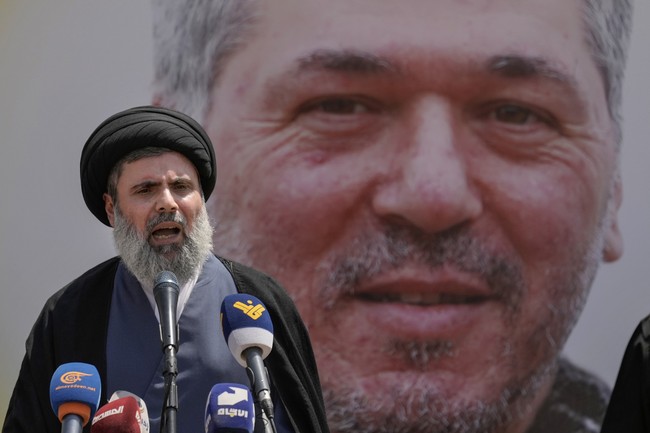We support our Publishers and Content Creators. You can view this story on their website by CLICKING HERE.

So much for Iran’s encirclement strategy in the Middle East, if these reports turn out to be accurate. Not only did Iran lose much of its advanced air defenses in the Israeli strike over the weekend, their forward proxy army may collapse soon as its terror troops head for Syria. Arabic media report mass Hezbollah desertions in the face of a determined IDF ground campaign, and nearly no effective communications between command and field units:
Advertisement
After over a year of launching aerial attacks against northern Israel, Hezbollah has reportedly begun to crack as the Iran-backed terror group has experienced a wave of desertions, sources told the Arabic independent online newspaper Elaph in a report published Sunday. …
Those defecting, according to the source, are not reporting when summoned by senior terrorists and not waiting in their assigned locations. Other terrorists have reportedly fled to Syrian territory with their families, attempting to avoid any confrontation with Israel at close range. …
As a result of combatants abandoning their posts, Hezbollah is now reportedly struggling to communicate with its men on the ground. There are also fears that the defections, now mainly a phenomenon in southern Lebanon, will spread to terrorists throughout the country, the source claimed.
The confrontations on the southern border and escape by Hezbollah combatants have reportedly left the group struggling to recruit new terrorists to fuel its fight against Israel.
To no one’s great shock, the loss of thousands of command personnel to a rigged-beeper operation does not instill confidence in command. Neither do continuous and precise Israeli strikes on key command and finance sites in Beirut. The Israelis have clearly read Hezbollah’s mail for a long time, and potential recruits have to wonder how long it will take to find them if they join up — not to mention how Hezbollah plans to pay them.
Advertisement
We can take this morale collapse with a grain of salt, but perhaps not a very large grain. Arabic media passes along rumor as fact in some instances, although the Jerusalem Post does a pretty good job of vetting the most conspiratorial speculation out of their reporting. We might expect a rising level of desertions after Operation Grim Beeper and the elimination of nearly all the rest of Hezbollah leadership in IDF strikes afterward. The elimination of Al-Qard al-Hasan financial assets means no one will get paid, not until Iran can set up some new system of money laundering, which could take months — even assuming that’s a priority at the moment.
The other reason to consider is the lack of tentativeness in the Israeli offensive. It’s been a generation or more since the 2006 war and the end of Israeli occupation in the sub-Litani region. This generation of Hezbollah jihadis have never seen the IDF when it’s really angry and determined. If Hezbollah command remained intact, they could get grizzled veterans in place to keep the greener recruits from getting spooked and running away, but all of those people are either dead or disabled from Pagercide and the strikes in Beirut. The loss of both Nasrallah and Hashem Safieddine in rapid succession had to be a shock to the rank and file. Without effective command and communications, panic could easily set in when this set of ground troops realized that they are little more than a drug gang going up against a world-class infantry with combined-arms skills perhaps second to none.
Advertisement
There may be some signs that the Gazans have had enough of Hamas too, although not necessarily that Hamas has had enough. The Jerusalem Post also reports on a recently released video from an interrogation that confirms Hamas uses hospitals and ambulances to shield their terror operations, and that the Gazans want them out. Or at least one Gazan does:
In the video, the driver, reportedly apprehended on suspicion of involvement in terror activities, confirms his role as driver and paramedic at the Health Ministry in the Kamal Adwan and Al-Ahli Arab Hospitals.
“Hamas military operatives are present; they are in the courtyards, at the gates of the buildings, in the offices of Kamal Adwan Hospital,” the driver stated. “They operate ambulances to transport their wounded military operatives, and to transport them for their missions, and this is instead of using the ambulances for the benefit of civilians.”
“We, the public in the northern Gaza Strip, are sick of this situation. We have had enough; they (Hamas) are stationed in the hospitals, stationed in the schools,” the driver confirmed.
That news isn’t so good for the IDF as the purported news out of southern Lebanon. This report suggests that morale and cohesion still remain in Hamas to a larger degree, and that they have not begun to fall apart after the death of Yahya Sinwar. Despite Benjamin Netanyahu’s offer to allow safe passage out of Gaza for Hamas operatives who return the hostages, it doesn’t appear that discipline has broken down as much as it may have in Lebanon. That would indicate a lot of hard fighting, especially in northern Gaza where Hamas has tried to regroup even without any reliable resupply ability.
Advertisement
Nevertheless, it’s clear that Hamas is heading for destruction, even if collapse doesn’t come first. All of this puts Tehran’s regional strategy in tatters, especially with the IDF defenestration of their air defenses over the weekend. Israel proved again they can strike when, where, and how they want all the way to Tehran, and neither Hamas nor Hezbollah can effectively deter them now. That’s one reason that Iran has ramped up the rhetoric today after first downplaying the Israeli retaliation, promising “bitter, unimaginable consequences” for it. Rhetoric may be all the deterrence they have left.
Addendum: This probably doesn’t help with cohesion and discipline either:
🔴 The Commander of Hezbollah’s Bint Jbeil Area, Ahmed Jafar Maatouk, was eliminated in an IAF strike.
A day later, the IAF also eliminated his successor and Hezbollah’s head of artillery in the Bint Jbeil area.
These three terrorists directed and carried out numerous… pic.twitter.com/Hg8iasUA4X
— Israel Defense Forces (@IDF) October 27, 2024
These three terrorists directed and carried out numerous terrorist attacks from the Bint Jbeil area including launching anti-tank missiles toward Israeli civilians and IDF troops operating in southern Lebanon.
That’s three field commanders in a single day. Not only does that significantly erode Hezbollah command and control, it also makes it very clear to potential recruits just how outclassed Hezbollah is in a real war. A real war that they started, too.
Advertisement

 Conservative
Conservative  Search
Search Trending
Trending Current News
Current News 







